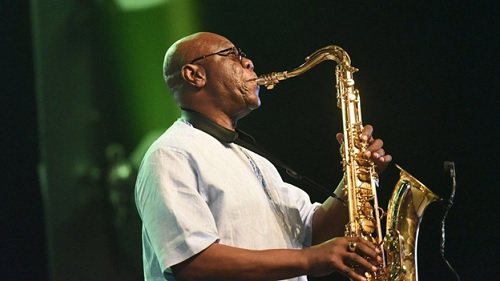
BY YOHANES JEMANEH
The coronavirus pandemic has robed the world its various icons and Africa is not different. The musical stars of the continent died of COVID 19 in one or the other way. Among these music icons are Manu Dibango, Mory Kanté and Aurlus Mabele.
The African saxophone legend Manu Dibango, best known for his 1972 hit Soul Makossa – is one of the first global stars to die from COVID-19. Dibango fused jazz and funk music with traditional sounds of Cameroon.
Africans were heard the death of the musician with intense shock and sadness. “It is with deep sadness that we announce you the loss of Manu Dibango, our Papy Groove,” a statement on his official Facebook page read.
Top African musicians Angelique Kidjo and Youssou Ndour have led tributes to Dibango mentioning that he was a giant African musician and a people person. Kidjo shared video, recorded months ago, of her rehearsing the end of Soul Makossa with Dibango. “You’re the original giant of African music and a beautiful human being,” she tweeted.
Ndour described Dibango as a big brother and a pride for Cameroon and all of Africa. Both Ndour and Kidjo, along with other stars such as Salif Keita, Papa Wemba and King Sunny Ade, worked on Dibango’s 1994 album Wakafrika.
“It is not up to me to say, ‘I want this’. When you are gone, it is finished, Dibango once said in his interview with BBC speaking about how he wanted to be remembered. Surprisingly, Dibango’s musical career spanned for more than six decades.
He was sent to high school in France where he learnt how to play the saxophone. The first tune he performed, in front of fellow students, was When the Saints Go Marching In, he told the BBC. To the disappointment of his father, Dibango failed his high school exams and took up music performing in nightclubs in Belgium instead. He was died on March 2020 at the age of 66.
Congolese singer Aurlus Mabele is another music icon of Africa who died of the pandemic at 66. He was known as “the king of soukous,” the energetic dance hall music that blends traditional African and Caribbean rhythms with pop and soul.
His death was confirmed by his daughter, singer Liza Monet, who said her father had infected by the coronavirus. The singer had experienced a stroke a few years ago and had been in fragile health.
Mabele’s biography tells that the artist had climbed the ladder of fame across Africa in 80s with up-tempo hits and high-wattage performances accentuated by spectacular dance moves. Mabele was founded a musical group called Les Ndimbola Lokole and gained popularity with his songs like Waka Waka and Zebola.
After moving to France in the 1980s, Mabele helped start the band Loketo. Leading this band, he had worked with the renowned guitarist Diblo Dibala. The band thrived on developing and playing soukous, a modern variation of the Congolese rumba music. The word soukous is derived from the French word “secouer,” which means “to shake”. Following the fame of Loketo band, this genre took hold in dance halls around the world including France.
Before breaking up in the 1990s, the band recorded energetic songs like Extra Ball, Douce Isabelle and Choc a Distance and sold millions of albums worldwide. The band toured Africa, Europe, the Caribbean and the United States.
Mabele was born Aurélien Miatsonama on 24 October 1953 in Brazzaville. His death drew messages of condolence from the globe. Loketo band member Mav Cacharel wrote on Facebook, “May the peace and protection of the Lord remain in us.”
The year 2021 also witnessed the passing of Guinean singer Mory Kanté who had played a crucial role in acquainting African music to world with popular songs like Yéké Yéké. Kanté was died in hospital at the age of 70. Kanté’s death was a result of health problems, his son Balla Kanté told AFP. “He suffered from chronic illnesses and often travelled to France for treatment but that was no longer possible with the coronavirus,” he stressed.
Kanté was known as a distinguished player of kora – a West African harp. His song Yéké Yéké became a huge hit in the late 1980s.
Learning the death of Kanté, many musicians were paid tributes. Senegalese musician Youssou N’Dour was expressed that he felt a huge void on knowing of Kanté’s death describing him as “a baobab of African culture”. Guinean president Alpha Condé also heard expressing sadness and admiration to the late singer. Condé said twitted that African culture was in mourning and thanked Kanté for his “exceptional” career.
In the 1970s, Kanté had joined Mali’s legendary group the Rail Band of Bamako and performed alongside Salif Keita and became the lead singer after Keita left. His international success realized in 1988 following the release of his album Akwaba Beach that comprised of various songs including Yéké Yéké. Millions of copies of Yéké Yéké were sold and Akwaba Beach became the best-selling African album of that time. This album famed Kanté worldwide. And he was also involved in various humanitarian activities in Africa and Eastern Europe as a goodwill ambassador for international organizations like UNICEF, FAO and UNHCR.
However, it was a double suffrage to his family and friends to see the veteran artist dying lack of treatment as the world was closed due to the pandemic. His continent on the other hand, hasn’t the capacity of treating his health complications.
Therefore, Africans should consolidate efforts to prepare themselves in building their capacity to overcome health challenges by themselves. Especially in time of pandemic occurrence, strengthening prevention mechanisms and experimenting on vaccines is crucial to avert untimed deaths of Africans and icons of the continent like the aforementioned ones.
The Ethiopian Herald February 6/2022





